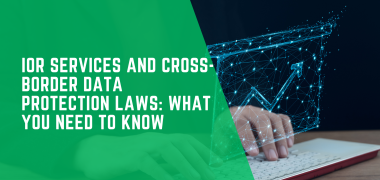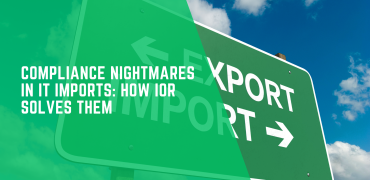Introduction
In today’s globalized digital economy, businesses frequently engage in cross-border transactions that involve the transfer of sensitive data. Importer of Record (IOR) services play a crucial role in ensuring compliance with international trade regulations when moving goods across borders. However, an often-overlooked aspect of IOR services is their intersection with data protection laws, which govern how personal and business data should be handled across different jurisdictions. Understanding these legal frameworks is essential to avoid penalties and maintain compliance in an increasingly complex regulatory environment.
What Are IOR Services?
Importer of Record (IOR) services involve a third party taking legal responsibility for imported goods. This includes managing customs clearance, paying duties and taxes, and ensuring compliance with relevant regulations. Companies that lack a local presence in a target market often rely on IOR providers to legally facilitate their shipments.
The primary responsibilities of an IOR include:
- Ensuring compliance with local and international trade laws.
- Handling customs documentation and clearance.
- Paying applicable duties, taxes, and tariffs.
- Managing regulatory and licensing requirements.
- Maintaining accurate records for audits and compliance purposes.
Given the extensive legal obligations tied to importation, IOR services provide businesses with a structured and compliant approach to navigating complex trade environments.
The Growing Importance of Data Protection in Cross-Border Trade
With increasing digitalization, the transfer of business and customer data across borders has become commonplace. However, as data privacy regulations become stricter, businesses must ensure that their IOR operations align with global data protection laws.
Key reasons why data protection matters in IOR services:
- Regulatory Compliance: Many jurisdictions impose strict data protection laws that impact how business and customer data is collected, stored, and transferred.
- Data Security Risks: Sensitive data related to imports, such as customer details, invoices, and compliance documents, must be safeguarded against breaches.
- Legal Liabilities: Failure to comply with data protection laws can result in hefty fines, legal disputes, and reputational damage.
Key Data Protection Regulations Affecting IOR Services
Various data protection laws impact how companies handle cross-border data transfers. Below are some of the most influential regulations that businesses must consider when engaging in IOR services:
1. General Data Protection Regulation (GDPR) – European Union
The GDPR governs the processing of personal data of EU citizens, including its transfer outside the European Economic Area (EEA). IOR service providers handling data of EU-based customers must ensure compliance with GDPR principles, which include:
- Lawful Processing: Data must be collected and processed for legitimate business purposes.
- Consent & Transparency: Businesses must obtain explicit consent before processing personal data.
- Cross-Border Data Transfers: Companies must use mechanisms such as Standard Contractual Clauses (SCCs) or Binding Corporate Rules (BCRs) when transferring data outside the EU.
- Data Minimization: Only necessary data should be collected and stored.
Non-compliance with GDPR can lead to fines of up to €20 million or 4% of annual global revenue, whichever is higher.
2. California Consumer Privacy Act (CCPA) – United States
The CCPA applies to companies handling the personal data of California residents, even if they are not based in the U.S. It grants consumers rights over their data and imposes obligations on businesses to:
- Disclose Data Collection Practices: Companies must inform consumers about the data being collected and how it will be used.
- Provide Opt-Out Options: Customers can request that their personal data not be sold or shared with third parties.
- Ensure Data Security: Businesses must take appropriate measures to protect consumer data from breaches.
Since many multinational corporations operate in California, businesses engaging in IOR services must be mindful of CCPA compliance.
3. Personal Data Protection Act (PDPA) – Singapore
Singapore’s PDPA sets guidelines for businesses on how they can collect, use, and disclose personal data. This law is particularly relevant for businesses conducting trade in Asia and requires:
- Consent for Data Processing: Companies must obtain clear consent before collecting personal information.
- Purpose Limitation: Data can only be used for the purposes for which it was collected.
- International Transfers: Businesses must ensure that personal data sent outside Singapore is protected at a standard comparable to the PDPA.
4. China’s Personal Information Protection Law (PIPL)
China’s PIPL is one of the most stringent data protection laws, requiring businesses to obtain government approval before transferring data out of China. It mandates:
- Data Localization: Some categories of personal data must be stored within China.
- Explicit Consent: Users must be informed about how their data is collected, used, and shared.
- Security Assessments: International data transfers are subject to government security reviews.
IOR service providers dealing with China must carefully navigate these restrictions to avoid penalties.
Best Practices for Ensuring Compliance in IOR Services
Given the complexities of cross-border trade and data protection laws, businesses should adopt best practices to stay compliant:
- Conduct Data Protection Impact Assessments (DPIAs)
- Evaluate the risks associated with data transfers in IOR services.
- Identify compliance gaps and implement corrective measures.
- Implement Strong Data Encryption and Security Protocols
- Use encryption to protect sensitive import-related data.
- Establish secure channels for transmitting personal and business information.
- Use Standard Contractual Clauses (SCCs) and Data Processing Agreements (DPAs)
- Ensure agreements with IOR providers include GDPR-compliant clauses.
- Establish clear terms for data access, usage, and retention.
- Limit Data Collection to Necessary Information
- Avoid excessive data collection and storage to reduce security risks.
- Train Employees on Data Privacy Regulations
- Educate staff handling IOR processes about relevant data protection laws.
- Regularly Audit Compliance Practices
- Conduct periodic reviews to ensure adherence to evolving regulations.
Conclusion
IOR services provide businesses with an essential pathway to navigate international trade regulations, but the growing landscape of data protection laws adds a new layer of complexity. Companies must ensure that they comply with key regulations like GDPR, CCPA, PDPA, and PIPL to avoid legal and financial consequences. By implementing strong data protection measures and aligning business operations with global privacy laws, organizations can safeguard their data while facilitating seamless cross-border transactions.




